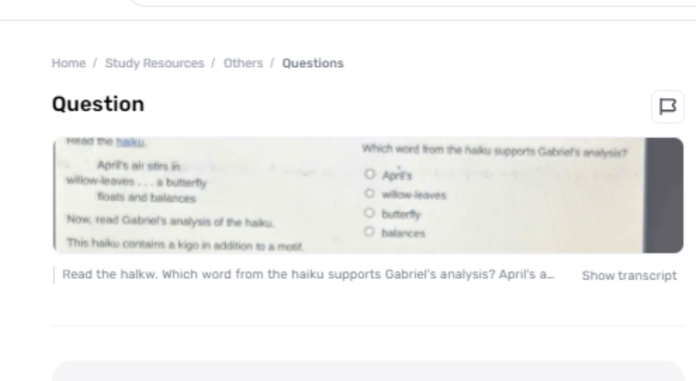A haiku could be a conventional shape of Japanese verse characterized by its brief structure and center on nature. Its compact arrangement, comprising three lines with a syllable design of 5-7-5, requires the cautious choice of words to communicate profound meaning. In analyzing a haiku, particular words can play a pivotal part in supporting translations and examinations. This article investigates which word from the haiku supports gabriel’s analysis? centering on how word choice improves topical understanding and expository experiences.
Understanding Haiku Structure
Haikus are organized to inspire striking symbolism and enthusiastic profundity inside a restricted number of syllables. Each haiku ordinarily captures a minute in nature or a brief feeling, with words carefully chosen to reflect the quintessence of the subject. The primary line frequently sets the scene, the moment line creates the subject or feeling, and the third line gives a determination or a piercing perception. Analyzing a haiku includes analyzing how each word contributes to the general meaning and how it adjusts with any given examination.
Gabriel’s Investigation of the Haiku
Gabriel’s investigation of a haiku might center on different components, such as the poem’s thematic content, symbolism, or enthusiastic effect. For occurrence, Gabriel may contend that a specific word within the haiku underscores a particular subject or improves the symbolism. To bolster this examination, it is fundamental to distinguish how a person’s words align with Gabriel’s translation and contribute to a more profound understanding of the haiku’s meaning.
Distinguishing Key Words within the Haiku
In analyzing a haiku, certain words stand out for their importance in passing on meaning. For illustration, in case Gabriel’s examination highlights the topic of isolation or the section of time, particular words related to these topics would be essential. Words that bring out tangible encounters, feelings, or distinctive symbolism can be significant in supporting Gabriel’s elucidation. Distinguishing these keywords includes analyzing how they work inside the lyric and how they relate to the examination displayed.
How Word Choice Improves Topical Understanding
The choice of words in a haiku specifically impacts its topical profundity and passionate reverberation. Words that inspire specific pictures or sentiments offer assistance in constructing the haiku’s by and large effect. For occasion, if Gabriel’s investigation centers on subjects of impermanence or quietness, words that pass on these concepts, such as a drift or stillness, end up central to the elucidation. These words do not reflect the haiku’s subject but moreover, extend the reader’s passionate association with the lyric. By carefully considering how each word bolsters the investigation, one picks up an understanding of the haiku’s imaginative and topical layers.
Case of Word Support
Consider a haiku that investigates the topic of transitory excellence. In case Gabriel’s examination emphasizes the transitory nature of the minute captured within the haiku, a word like fading or ephemeral would back this elucidation. For occurrence, in case the haiku incorporates the word whisper, which inspires a sense of something unpretentious and transitory, this choice strengthens Gabriel’s examination by highlighting the sensitive and transitory nature of the subject being portrayed. The word whisper contributes to a more profound understanding of the haiku’s topic by emphasizing the calm, short-lived viewpoint of the scene.
Method for Replying Questions on the Gauth App
1. Obtain and Enlist
Get the Gauth app from your app store and set up a modern account.
2. Access Your Account
Dispatch the app and log in along with your username and watchword.
3. Find the Address
Utilize the look instrument or investigate the question list to identify the one you would like to reply to.
4. Enter and Send Your Reply
Sort your reaction into the content box and yield it for review.

Conclusion
In conclusion, distinguishing which word from a haiku underpins Gabriel’s investigation includes analyzing how particular words contribute to the poem’s general meaning and topical expression. Words play a basic part in passing on the passionate and tactile encounters delineated within the haiku. By centering on how these words adjust with Gabriel’s elucidation, one can pick up a clearer understanding of the haiku’s effect and importance. The cautious choice of words in haikus underscores their capacity to inspire profound insights inside a compact idyllic shape, highlighting the perplexing relationship between dialect and examination.












